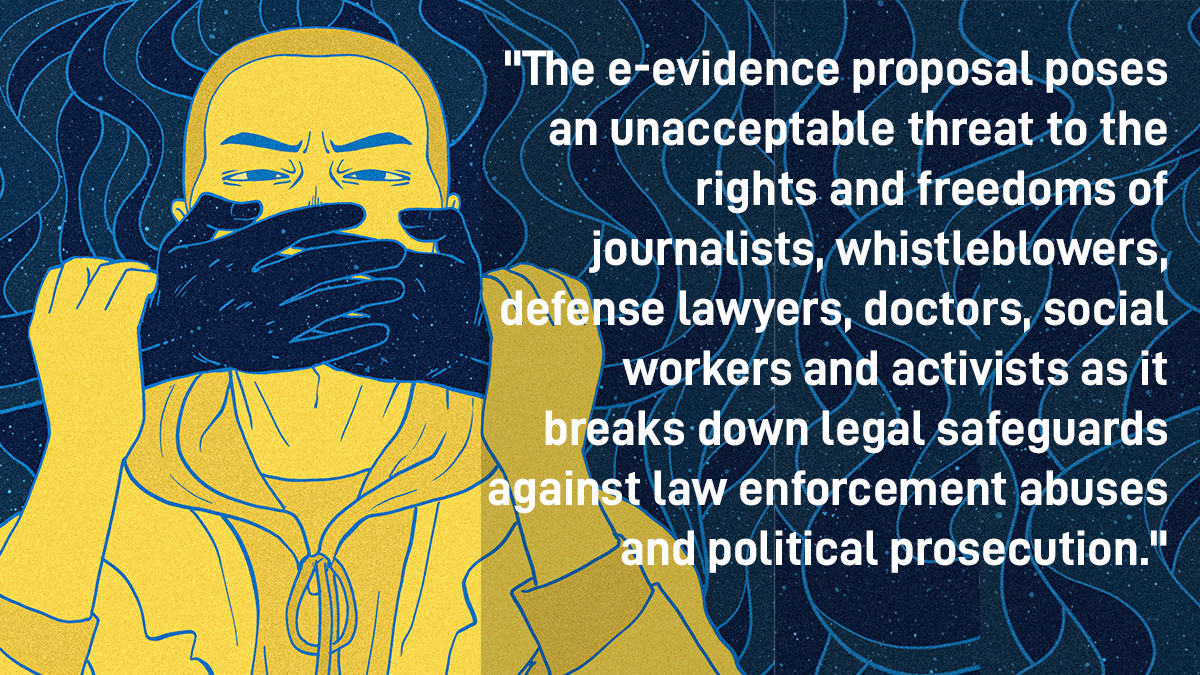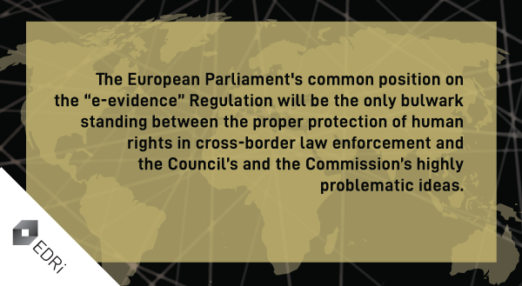E-Evidence: trilogues kick off on safeguards vs. efficiency
The Regulation on European production and preservation orders for electronic evidence in criminal matters (E-Evidence) aims to create clear rules on how a judicial authority in one Member State can request electronic evidence from a service provider in another Member State. One such use case would be requesting user data from a platform in another EU country during an investigation. We wrote about our main issues in the past.
Filter resources
-

E-Evidence: trilogues kick off on safeguards vs. efficiency
The Regulation on European production and preservation orders for electronic evidence in criminal matters (E-Evidence) aims to create clear rules on how a judicial authority in one Member State can request electronic evidence from a service provider in another Member State. One such use case would be requesting user data from a platform in another EU country during an investigation. We wrote about our main issues in the past.
Read more
-

2021: Important consultations for your Digital Rights!
Public consultations are an opportunity to influence future legislation at an early stage, in the European Union and beyond. They are your opportunity to help shaping a brighter future for digital rights, such as your right to a private life, data protection, or your freedom of opinion and expression.
Read more
-

“E-evidence”: Mixed results in the European Parliament
The European Parliament Committee on Civil Liberties (LIBE) agreed on a final text for the Regulation on cross border access to data (so-called “e-evidence” proposal). Despite some improvements designed to better protect people against law enforcement overreach across jurisdictions, the Committee’s majority has unfortunately also made major compromises that will put the rights of journalists, lawyers, doctors, social workers and individuals in general at risk.
Read more
-

Looking back at digital rights in the era of a surveillance pandemic
2020 started as a year to build momentum to tackle various digital rights issues, including mass surveillance and freedom of expression online. Needless to say, the global pandemic disrupted not only these efforts but also our health, personal relations, basic survival needs and ways to organise around human rights. After 9 months of living and working in a pandemic, we look back at what we achieved and the ways forward from here.
Read more
-

EDRi with 25 organisations urge Parliament to protect journalists, doctors, lawyers, social services
Together with a coalition of 25 organisations and companies, EDRi urges members of the European Parliament’s Civil Liberties, Justice and Home Affairs Committee (LIBE) to include strong procedural safeguards in the so called “E-Evidence Regulation”.
Read more
-

Europol: Non-accountable cooperation with IT companies could go further
There is an ongoing mantra among law enforcement authorities in Europe according to which private companies are indispensable partners in the fight against “cyber-enabled” crimes as they are often in possession of personal data relevant for law enforcement operations. For that reason, police authorities increasingly attempt to lay hands on data held by companies – sometimes in disregard to the safeguards imposed by long-standing judicial cooperation mechanisms.
Read more
-

Germany: Invading refugees’ phones – security or population control?
In its new study, EDRi member Society for Civil Rights (GFF) examines how German authorities sniff out refugees’ phones. The aim of “data carrier evaluation” is supposed to be determining a person’s identity and their country of origin. However, in reality, it violates refugees’ rights and does not produce any meaningful results.
Read more
-

E-evidence and human rights: The Parliament is not quite there yet
The European Parliament Committee on Civil Liberties (LIBE) is currently busy working out a compromise between its different political groups in order to establish a common position on the “e-evidence” Regulation.
Read more
-

Click here to allow notifications in cross-border access to data
From a fundamental rights perspective, it’s essential that the proposal enabling cross-border access to data for criminal proceedings (“e-evidence”) includes a notification mechanism. However, this requirement of a notification seems to be out of the question for those advocating for “efficiency” of cross-border criminal investigations, even if that means abandoning the most basic procedural safeguards […]
Read more
-

Double legality check in e-evidence: Bye bye “direct data requests”
After having tabled some 600 additional amendments, members of the European Parliament Committee on Civil Liberties (LIBE) are still discussing the conditions under which law enforcement authorities in the EU should access data for their criminal investigations in cross-border cases. One of the key areas of debate is the involvement of a second authority in […]
Read more
-

Amazon’s Rekognition shows its true colors
EDRi member Bits of Freedom has been investigating the problems associated with the use of facial recognition by the police in the public space. As part of this investigation they wanted to put this technology to the test themselves. How does facial recognition technology really work? Digital tourism On Dam Square, in the center of […]
Read more
-

ECtHR demands explanations on Polish intelligence agency surveillance
The European Court of Human Rights (ECtHR) has demanded the Polish government to provide an explanation on surveillance by its intelligence agencies. This is a result of complaints filed with the Strasbourg court in late 2017 and early 2018 by activists from EDRi member Panoptykon Foundation and Helsinki Foundation for Human Rights as well as […]
Read more
